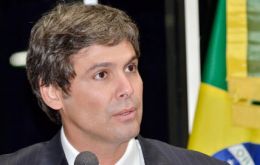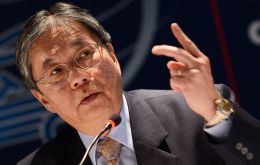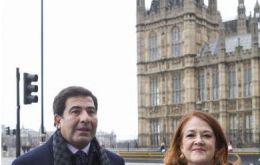MercoPress. South Atlantic News Agency
Economy
-
Wednesday, March 11th 2015 - 05:27 UTC
Falklands' 4.000 ewes to be AI with Australian Poll Merino

Australian Poll Merino genetics are being used to drive lamb survival in one of the world’s harshest wool producing environments of the Falkland Islands, reports The Rural, from Australia.
-
Wednesday, March 11th 2015 - 03:02 UTC
Petrobras whistleblower says Rousseff's party received US$ 200 million from Petrobras contracts

A former Petrobras executive told a congressional hearing in Brazil on Tuesday that the ruling political party received up to 200 million dollars skimmed from contracts with the state-run oil company, reiterating claims made in plea bargain testimony.
-
Tuesday, March 10th 2015 - 07:05 UTC
Brazilian lawmakers accused of Petrobras graft fight back

Brazil’s congressional heads denied involvement in the country’s largest graft scandal after being named among dozens of politicians for investigation. Renan Calheiros and Eduardo Cunha, the heads of the Senate and Lower House respectively, and Rio de Janeiro Senator Lindbergh Farias all rejected allegations of graft in the Petrobras kickback scheme dubbed “Carwash.”
-
Tuesday, March 10th 2015 - 06:56 UTC
Renewal of car quotas with Mexico reveals shortcomings of Brazilian industry

Brazil and Mexico announced the renewal of vehicle quotas for four years, delaying the implementation of a free-trade agreement between the two countries. Under the new agreement, Brazil and Mexico will permit $1.56 billion of duty-free vehicle imports for the first year of the agreement. That amount will rise 3% each year until the agreement expires, in 2019, when they’ll return to a free-trade regime.
-
Tuesday, March 10th 2015 - 06:46 UTC
ECLAC estimates 28% of Latin America's population live in poverty

Poverty affected 28% of Latin America’s population in 2014, revealing that its decline has stalled at around that level since 2012, while indigence rose to 12.0% from 11.3% during the same two-year period in an overall context of economic deceleration, according to the projections from a study released by the Economic Commission for Latin America and the Caribbean (ECLAC) in Santiago, Chile.
-
Tuesday, March 10th 2015 - 03:21 UTC
Argentina's top tax official attends HSBC hearings at UK Parliament

Argentina wants HSBC Holdings Plc to repatriate 3.5 billion dollars the bank's Argentine branch moved offshore to help clients evade taxes and move capital abroad, the country's tax chief Ricardo Echegaray said on Monday during a hearing which took place at the House of Commons in London, where top executives of HSBC were present.
-
Monday, March 9th 2015 - 11:45 UTC
February's FAO Food Price Index at is lowest value since early 2010

The FAO Food Price Index averaged 179. 4 points in February 2015, down 1.8 points (1.0 percent) from its January value and 29 points (14.0 percent) below its level in February 2014. Prices of cereals, meat and, especially, sugar, dipped last month, while they remained steady in the case of oils and rebounded sharply in the case of dairy products. The index has been on a declining path since April 2014 and has now reached its lowest value since July 2010.
-
Saturday, March 7th 2015 - 08:29 UTC
US economy keeps creating jobs, while unemployment drops to 5.5%

US economy added 295,000 jobs in February, while the unemployment rate fell to 5.5% from 5.7%, according to Labor Department figures. It was the 12th month running that the economy added more than 200,000 jobs, the longest such run since 1994.
-
Saturday, March 7th 2015 - 07:59 UTC
Argentina's beef production tepid recovery forecasted to remain flat in 2015

Argentina's revival as a major force in beef has been slowed by a dent to calving rates from poor weather, besides by a reluctance by producers to maximize animal weights, in the face of export restrictions.
-
Saturday, March 7th 2015 - 07:37 UTC
February inflation in Brazil at 7.7% is at its highest level since May 2005

Inflation jumped in Brazil on February with price increases hitting an annual rate of 7.7%, the highest in nearly nine years, officials said on Friday. The national statistics institute IBGE said prices rose 1.22% in February, pushing inflation well above the government's target ceiling of 6.5%.
